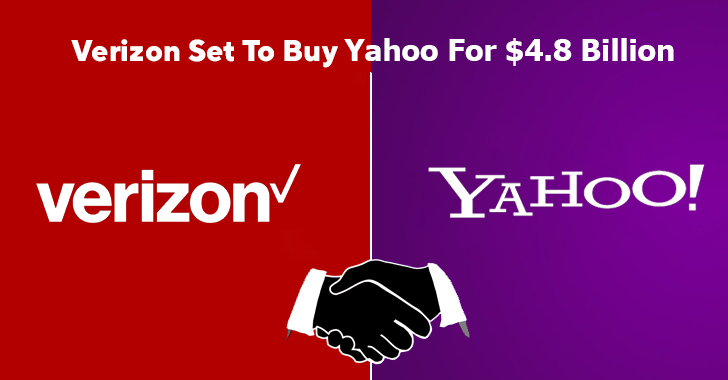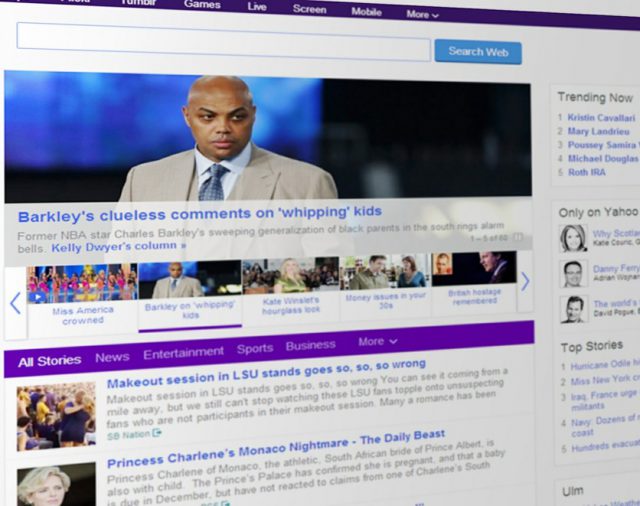Verizon has agreed to buy Yahoo’s core operating business for roughly $4.83 billion cash, in a deal that ends uncertainty over the future of the struggling internet group. Here are key dates in the launch and evolution of Yahoo.
- January 1994: In the early days on the internet, when no one knew what content was out there, Jerry Yang and David Filo, two graduate students at Stanford University, created a website called “Jerry and David’s guide to the world wide web”.
- Spring 1994: Yang and Mr. Filo renamed their site Yahoo, standing for “Yet Another Hierarchically Organized Oracle”, because it is arranged in categories and subcategories.
- Early 1995:com domain name was created, the company was incorporated and it raised funding from Sequoia Capital.
- April 1996: Yahoo went public raising about $33.8m, with an opening share price of $13 and a valuation of $848m.
- September 1998: Google was founded by Stanford PhD students Larry Page and Sergey Brin. A year later, fellow Stanford graduate Marissa Mayer joined Google as employee number 20.
- December 1999: Yahoo’s stock price doubled in just a month, closing at an all-time high of $108 a share in January 2000.
- Early 2000s: Yahoo’s web search was powered by Google.
- Spring 2001: As Yahoo was hit by the dotcom bust, chief executive Tim Koogle, who had led the company since 1995, was replaced by Warner Brothers executive Terry Semel.
- September 2001: Shares in Yahoo sank to an all-time low of $4.40.
- Summer 2002: Semel tried to buy Google for about $3bn but is rebuffed. Google’s co-founders reportedly want $5bn.
- 2003: Having bought up smaller search engines, Yahoo begins using their web crawling technology to power the web search function on Yahoo.com.
- 2004: Google goes public, valuing the company at $27bn as the share price closes just above $100.
- August 2005: Yang arranged for Yahoo to buy a 40 per cent stake in Chinese e-commerce group Alibaba for $1bn and took control of Yahoo China.
- June 2007: Semel resigned, replaced by co-founder Mr. Yang.
- February 2008: Months into his tenure, Mr. Yang is faced with an unsolicited offer from Microsoft to buy Yahoo for $44.6bn. He argued that the deal undervalues the company and Microsoft walks away in May.
- January 2009: Carol Bartz, former chief executive of Autodesk, joins Yahoo as chief executive after Mr. Yang stepped down in November 2008.
- September 2011: Ms Bartz left as revenues continued to fall and display advertising begun to suffer, sending an email to employees saying she was fired over the phone by Yahoo’s chairman.
- October 2011: Activist investor Dan Loeb argued that Yahoo needed new leadership and a way of unlocking the value in its Asian assets, which were Alibaba and Yahoo Japan.
- January 2012: Scott Thompson, president of eBay’s PayPal division, was appointed Yahoo chief executive, shaking up the company with leadership reorganization and thousands of redundancies.

- May 2012: Thompson stepped down after Mr. Loeb questioned whether he embellished his academic credentials and whether the Yahoo board completed appropriate diligence when hiring him. Mr. Loeb got three seats on the board.
- July 2012: Yahoo poached Marissa Mayer from Google, where she had become a senior executive focusing on products including search, to lead a turnaround.
- September 2012: Yahoo completed the first stage of repurchasing Alibaba shares and handed about $3bn back to shareholders.
- 2013: Ms Mayer went on an acquisition spree, buying start-ups, arguing that new people and product expertise will revive the company. In May, Yahoo paid $1.1bn for blogging site Tumblr.
- July 2013: Yahoo bought back Mr. Loeb’s stock for twice what he paid, bringing his profits to $1bn.
- January 2014: Yahoo fired Henrique de Castro, the chief operating officer brought in by Ms Mayer from Google to oversee advertising, paying a severance package of more than $60m.
- July 2014: Yahoo made a deal to keep a greater share of Alibaba when the company went public, selling just 27 per cent of its stake.
- September 2014: Alibaba became the world’s largest stock market flotation, valued at more than $230bn.
- October 2014: Shareholders turned on Ms Mayer after the Alibaba IPO, demanding to know more about how much of the cash they will get, how much she will spend on acquisitions and how much could end up in the pockets of the tax authorities. Activist investor Starboard Value called on Yahoo to explore a strategic tie-up with AOL to reduce the tax burden.
- January 2015: Yahoo announced plans to spin off its stake in Alibaba in what it says will be a tax-free transaction. It had to bundle a small part of its operating business with Alibaba, choosing to spin off Yahoo Small Business, which hosted websites.
- May 2015: Verizon bought AOL, as it hoped to grow in mobile video and advertising.
- September 2015: US tax authorities refused Yahoo’s request for a so-called private letter that would in effect have rubber stamped its spin-off proposal. Investors worried the company could be hit with a multibillion dollar tax bill if it presses ahead.
- October 2015: Yahoo stroke a deal with Google to halt the slide in its search business after Ms Mayer renegotiated its pact with Microsoft earlier in the year. Google had 72.4 per cent of the US search market, compared with Yahoo’s 4.8 per cent.
- December 2015: Yahoo abandoned its controversial spin-off plans after Starboard Value demanded it switch to selling its core business, instead.
- February 2016: Yahoo hired banks to examine options beyond the spin-off, moving closer to selling the business.
- March 2016: Starboard proposed sweeping away Yahoo’s entire board and replacing it with candidates chosen by the activist investor, putting pressure on the company to sell.
- April 2016: Suitors emerged for the company including US telecoms group Verizon, private equity groups and the British newspaper the Daily Mail. Yahoo reached a deal with Starboard, appointing four of the investors’ nominees. A filing showed Ms Mayer could be paid $55m in severance benefits if the company was sold and her employment was terminated without cause.
- July 2016: Yahoo’s lost deepen as revenues dropped 20 per cent year-on-year. Verizon confirmed that it will buy Yahoo’s core operating business for about $4.83bn cash, and will integrate it with AOL under long-time Verizon executive, Marni Walden. Yahoo’s chief executive says she has no plans to leave.
Source: The Financial Times
Save

